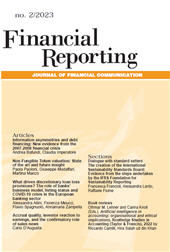Information asymmetries and debt financing: New evidence from the 2007-2008 financial crisis
5-38 p.
Purpose: Focusing on the 2007-2009 financial crisis, this study investigates how firms' and debtholders' information sensitivity jointly shape corporate debt financing. According to the pecking order theory, opaque firms prefer bank loans over more information sensitive sources like bonds and equity. When external conditions worsen, firms face difficulties accessing bank loans and look for alternatives. Yet, as bondholders are more information sensitive than banks, the substitution effect may not occur especially for firms with lower financial reporting quality (FRQ). Design/methodology/approach : a matching difference in differences approach is used to compare the debt financing of firms with and without access to corporate bond markets before and after the onset of the financial crisis. A sample of quarterly data of US-listed firms is analyzed for the 2006-2009 period. Findings : the reduction in debt financing due to the crisis was greater for firms with access to bond markets.
The effect is more pronounced for firms with lower FRQ. These firms also looked more for alternatives such as equity and cash resources.
-
Artículos del mismo número (disponibles individualmente)
-
-
Información
Código DOI: 10.3280/FR2023-002001
ISSN: 2036-6779
KEYWORDS
- Non fungible token, valuation, Accounting, Disclosure


